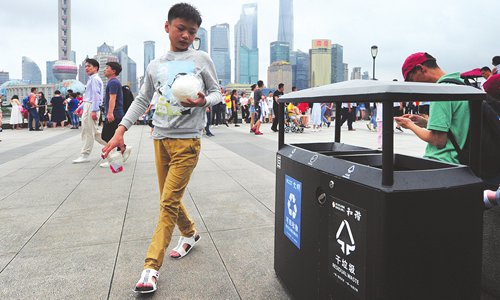Shanghai will set up clean and dust-free public spaces amid higher sanitation standards
By Du Qiongfang Source:Global Times Published: 2020/5/28 20:08:40

A boy disposes of garbage in the Bund, a landmark in Shanghai, on June 30. Photo: CFP
In its bid to further bolster the city aura and livability, Shanghai municipality's landscaping and city appearance authority has set up a much higher standard for the city's environmental hygiene. Authorities on Thursday announced to set up 70 public spaces across the city that will be kept spotlessly clean so residents and tourists can enjoy sitting on the ground.
According to Shanghai Landscaping and City Appearance Administrative Bureau, these spaces would be in areas, including scenic spots, commercial areas, transportation hubs and key roads, without any garbage, stain, dust, or puddle.
The 70 clean and dust-free spaces that are slated to be ready this year will cover a total area of 4.4 million square meters. A total of 320 such spaces covering an area of 31.15 million square meters, accounting for 15 percent of the total sanitation area of the city, will be created by 2025.
Shanghai's most popular landmark tourist attraction, Yuyuan Garden, is one of the 70 spotlessly clean areas.
According to Qiao Weicheng, secretary of Party branch and general manager of Shanghai Xinyuan Environmental Sanitary Service Company, sanitation standards set for the 70 areas this year are even higher than previous years so the company has trained the sanitation workers accordingly. The company is also responsible for maintaining the sanitation hygiene of the Yuyuan Garden area.
"We will mainly adopt the combination of human and machine to carry out the sanitation work," Qiao told the Global Times on Thursday.
Back in 2017, Shanghai first set a higher sanitation standard for the city's most popular scenic spots such as Nanjing Road East, People's Square, and the Bund in Huangpu district, introducing indoor cleaning methods in the outdoor sanitation work to create a refined sanitation demonstration area.
While most Shanghai netizens applauded the new sanitation standards and requirements for the city, some suggested the authorities to increase disciplinary measures against spitting. Several users also opined that residents' and tourists' hygiene habits such as no spitting and littering are more important than sanitation work.
Posted in: SOCIETY